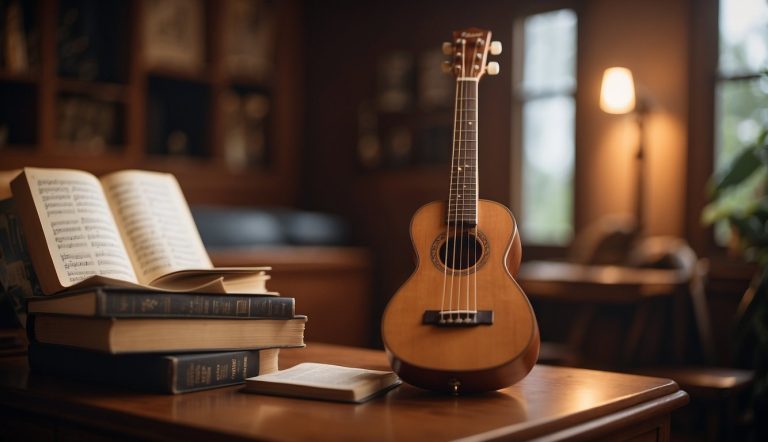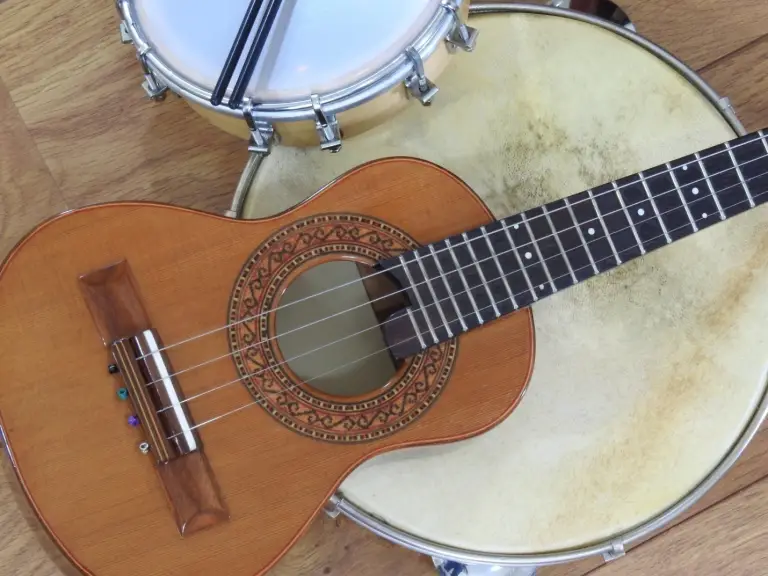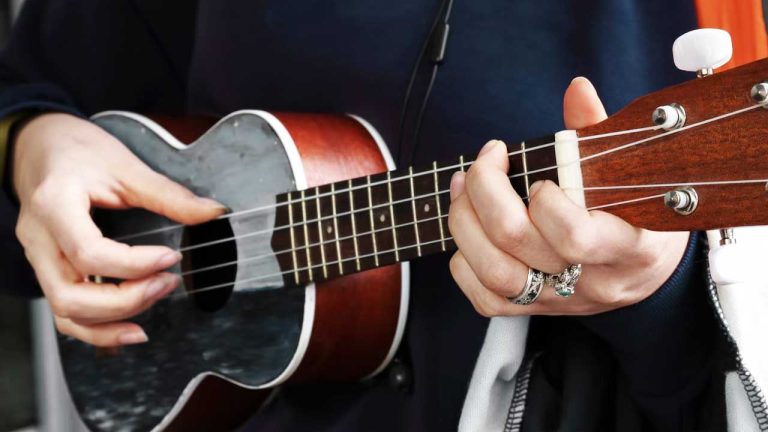Should You Learn the Banjo or the Ukulele?
Folkstrings.com is reader-supported. When you buy through links on our site, we may earn a small commission.
Banjos and ukuleles both have unique sounds that are appealing to many musicians.
Because of their similarities and vast differences, it can often become difficult attempting to decide which one strikes your musical fancy.
If you have never played either instrument, it is important to research both and learn as much as possible before diving in.
Table of Contents
- What Things are Similar Between the Banjo and Ukulele?
- Is the Banjo Harder Than the Ukulele?
- What Is the Banjolele?
- Banjo Vs. Banjolele: Main Differences
- Should You Learn the Banjo or the Ukulele? – Conclusion
What Things are Similar Between the Banjo and Ukulele?
The banjo and the ukulele are both stringed instruments. Ukuleles and banjos both have the same fretboard setup, though the number of strings and the tuning of the strings differ.
Although both instruments have strings, fretboards, and tuning pegs, this is where the similarities end.
For the most part, these two instruments are very different, and the sounds they produce lead to entirely different music genres.
The banjo offers a deeper and more soulful sound that lends itself beautifully to folk, bluegrass, and blues music.
The ukulele has a bright and lofty sound that is perfect for folk and pop music.
There is not much to compare in similarities because the construction of each instrument is so different.
Is the Banjo Harder Than the Ukulele?
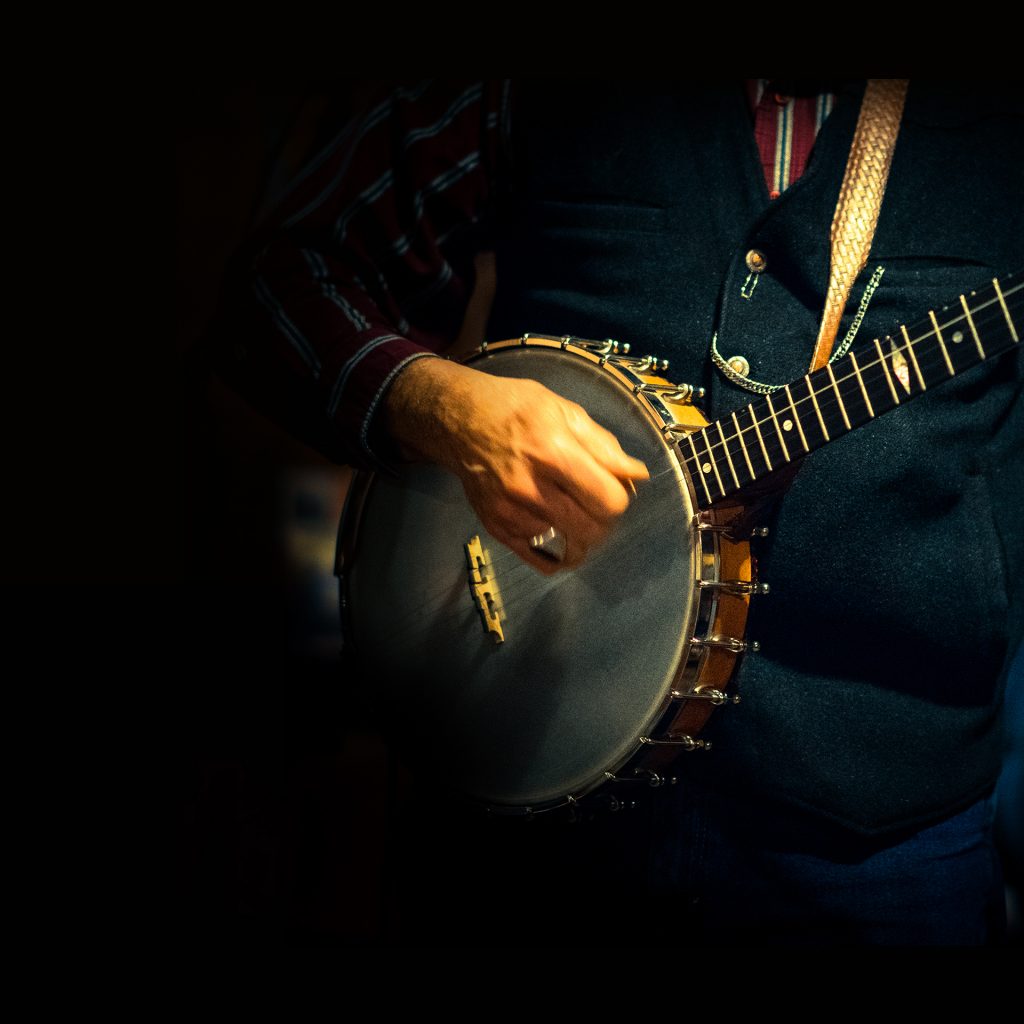
When deciding between playing these two instruments, it is important to know which one is more difficult to play.
Without a doubt, the answer to this question is the banjo.
The banjo is much more intimidating to play than the ukulele, for several reasons.
The ukulele is one of the simplest stringed instruments to learn because it has only a few basic chords.
You can learn three simple chords and will find you have mastered the basics of this smaller guitar family instrument.
On the other hand, it is slightly more difficult to play the ukulele over the banjo because the banjo is easier to fret and strum, due to the smaller gauge of string.
If you know how to play guitar already, the ukulele will be a natural fit, since they are similar in fretting and strumming styles.
Another thing that makes banjos more difficult is the variety and number of strings.
Banjos are also intimidating because they can be loud and obnoxious if played incorrectly.
You must have a strong right hand or you will find yourself struggling to make a banjo sound good.
If you are set on learning banjo, and there is no reason you shouldn’t, it will be helpful to find a mentor or a local teacher who can guide you in learning this special stringed instrument.
Those who are hoping to become the next Earl Scruggs will need to practice consistently.
They say no one ever masters the banjo, but some musicians will beg to differ.
In short
If you are searching for an instrument that is easy to pick up and learn to play casually, it is wise to choose the ukulele.
This instrument will not let you down, even if you are not interested in learning various strumming styles.
With just a couple of chords and a basic strum, you can serenade anyone and impress them.
On the other hand, if you are looking for a more challenging instrument to play, there is the banjo.
Some love it and some hate it, but you cannot deny it offers a distinctive sound that makes it stand out from all other stringed instruments.
What Is the Banjolele?
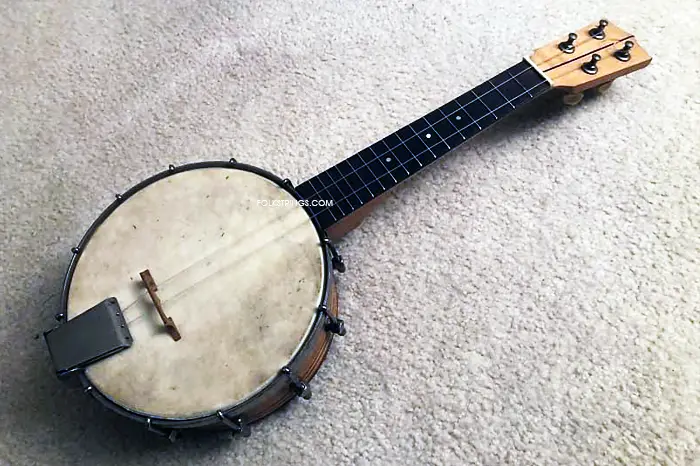
The banjolele, as you may have guessed by the name, is a combination of a banjo and a ukulele.
You may see this instrument called the banjo uke or a banjulele.
This instrument is more like a ukulele, with the obvious addition of a pot, covered in plastic or animal skin.
This instrument was first introduced in the early 1900s, and George Formby caused it to rise in popularity in the 1930s.
Compared to the banjo, you will find banjoleles are used less in modern music.
The creator of the banjolele combined the best of both worlds from the banjo and ukulele.
Banjoleles have shorter necks like the ukulele, but have the drum of a banjo, producing a nice loud sound.
This instrument combines the smaller scale, playing style, and tuning steps of a ukulele, with the distinctive and loud sound of the banjo.
All banjoleles are fretted and most are made of wood and metal, though there have been all-metal options in the past.
When they were first introduced to the music world, banjoleles had calf skin heads.
Today, most modern banjoleles are constructed with synthetic heads.
Purist musicians often prefer models with calf skin heads because they produce a more traditional sound.
Just like ukuleles, traditional banjoleles were fitted with gut strings.
Today, you will find most banjolele models to be fitted with nylon strings, and the third string will often be wound.
The banjolele is commonly tuned with G–C–E–A. As mentioned above, George Formby was the one to bring the banjolele to such popular heights.
He was a performer who used the instrument as an accompaniment to his comedic songs.
When researching the banjolele, you will find this musician’s name is attached to it more than any other.
Other musicians who have played the banjolele include Queen member, Brian May, George Harrison, and Peter Sellers, to name a few.
This instrument has even made its way into modern pop culture.
Banjo Vs. Banjolele: Main Differences
In most cases, you will find the banjolele to be lighter, smaller, and less expensive than a banjo.
Touring musicians often prefer to use the banjolele over the banjo because they are easier to carry around.
It is important to note that the sound of a banjo and banjolele slightly differ because of the strings.
Banjos have metal strings, while banjoleles typically have nylon strings.
Many musicians have found the banjolele to be easier to play than the banjo because of the strings.
When the two instruments were combined, the banjolele allowed those proficient in playing the ukulele to play an instrument that offered the sound of a banjo.
Consider the following main differences between these two stringed instruments.
· Banjoleles are typically easier to play than banjos because they are played in the same fret and strumming style as a ukulele.
· Banjoleles are often much less expensive. A good banjo could cost hundreds or even thousands of dollars, whereas a banjolele can be purchased for under $200.
· Banjoleles are less difficult to maintain because they are set up more like a ukulele.
· Banjoleles are smaller and ideal for those who cannot handle the bulk or weight of larger stringed instruments.
· Both the banjo and banjolele have resonators, so they are going to produce a much louder sound than a ukulele or guitar.
· The time it takes to learn both instruments will differ, depending on your experience and musical aptitude. If you have played the ukulele or guitar, the banjolele will seem like a natural transition instrument.
· You will discover it is much easier to find a banjo on the market than it is a banjolele. Many manufacturers make banjos, but the market for the banjolele is a little smaller.
· Banjos are used for folk, bluegrass, and the blues, while banjoleles can be used for a wider array of music genres.
Most people tune and play a banjolele just like they would a ukulele, making a banjo-type sound more accessible to musicians of all skill levels.
Many are amazed at how boisterous this instrument plays.
When purchasing a banjolele, you will want to look for one that feels heavy in the hands.
The design of a banjolele features heavier wood and more metal.
A well-designed banjolele should feel heavier than its size.
Should You Learn the Banjo or the Ukulele? – Conclusion
In choosing between the banjo or ukulele, there are a lot of considerations.
Sometimes, musicians will have to decide based on preference alone.
Some people prefer the deep and often aggressiveness of the banjo because there is no mistaking its unique sound.
Other musicians long for the lilting sounds of the ukulele.
Considering the ease of play, the ukulele undoubtedly shines above the banjo because of its simple chords and strumming style.
The ukulele is especially a natural transition instrument for those who are proficient in playing the guitar.
Guitar players find the smaller ukulele an easy instrument to play.
If you want the best of both worlds, consider the banjolele.
This unique instrument has the neck, fretboard, and tuning and strumming styles of the ukulele, with the body and sound of a banjo.
Why not have the best of both worlds?
Author Profile
-
Daniel Johnstone is an English writer with a love for stringed instruments from around the world.
He shares his love for these instruments through his writing for folkstrings.com, a website dedicated to all things related to folk string music.
Daniel's passion for music started at a young age, and he has since become an accomplished musician, playing guitar, cavaco, and recently, the harp.
His dedication to learning and sharing his knowledge of stringed instruments is evident in his insightful and engaging blog posts. Whether you're a seasoned musician or a beginner, Daniel's writing is sure to inspire and entertain you.
When he's not playing music or writing, you can find Daniel exploring new instruments and seeking out new sounds to share with his readers.
Latest entries
 AutoharpApril 4, 2024What Is the Autoharp Made Of: Exploring Its Materials and Craftsmanship
AutoharpApril 4, 2024What Is the Autoharp Made Of: Exploring Its Materials and Craftsmanship AutoharpApril 4, 2024Is Autoharp Easy to Play? Unveiling the Truth for Beginners
AutoharpApril 4, 2024Is Autoharp Easy to Play? Unveiling the Truth for Beginners AutoharpApril 4, 2024What Is an Autoharp Worth? Your Guide to Pricing and Value
AutoharpApril 4, 2024What Is an Autoharp Worth? Your Guide to Pricing and Value AutoharpApril 4, 2024Are Autoharp and Zither the Same Thing? Unraveling String Instrument Myths
AutoharpApril 4, 2024Are Autoharp and Zither the Same Thing? Unraveling String Instrument Myths
Affiliates:
This post may contain affiliate links that at no additional cost to you, the site may earn a small commission. We only recommend products we would use ourselves and all opinions expressed on this site are our own.
Accuracy Advice:
While we strive to provide up-to-date and accurate information, the content in this article may not reflect the most current research or medical guidelines. We encourage readers to do further research and consult with professionals for more personalized advice.
Our Recommendations:
The products and services mentioned in any of our articles are recommended based on our independent research and personal experience. We are not sponsored by any company. We aim to suggest products and services we believe are of high quality and could be beneficial to our readers.


